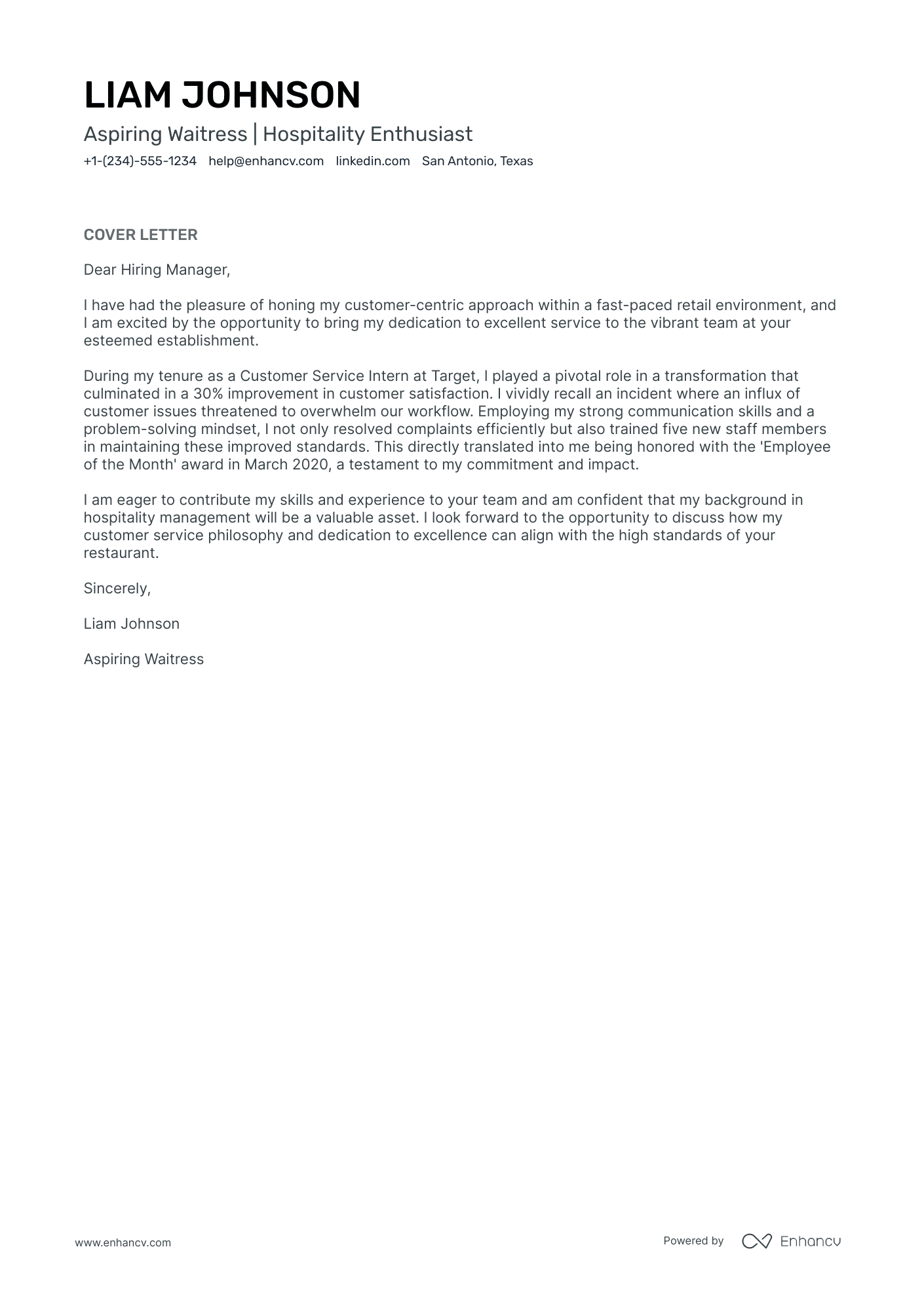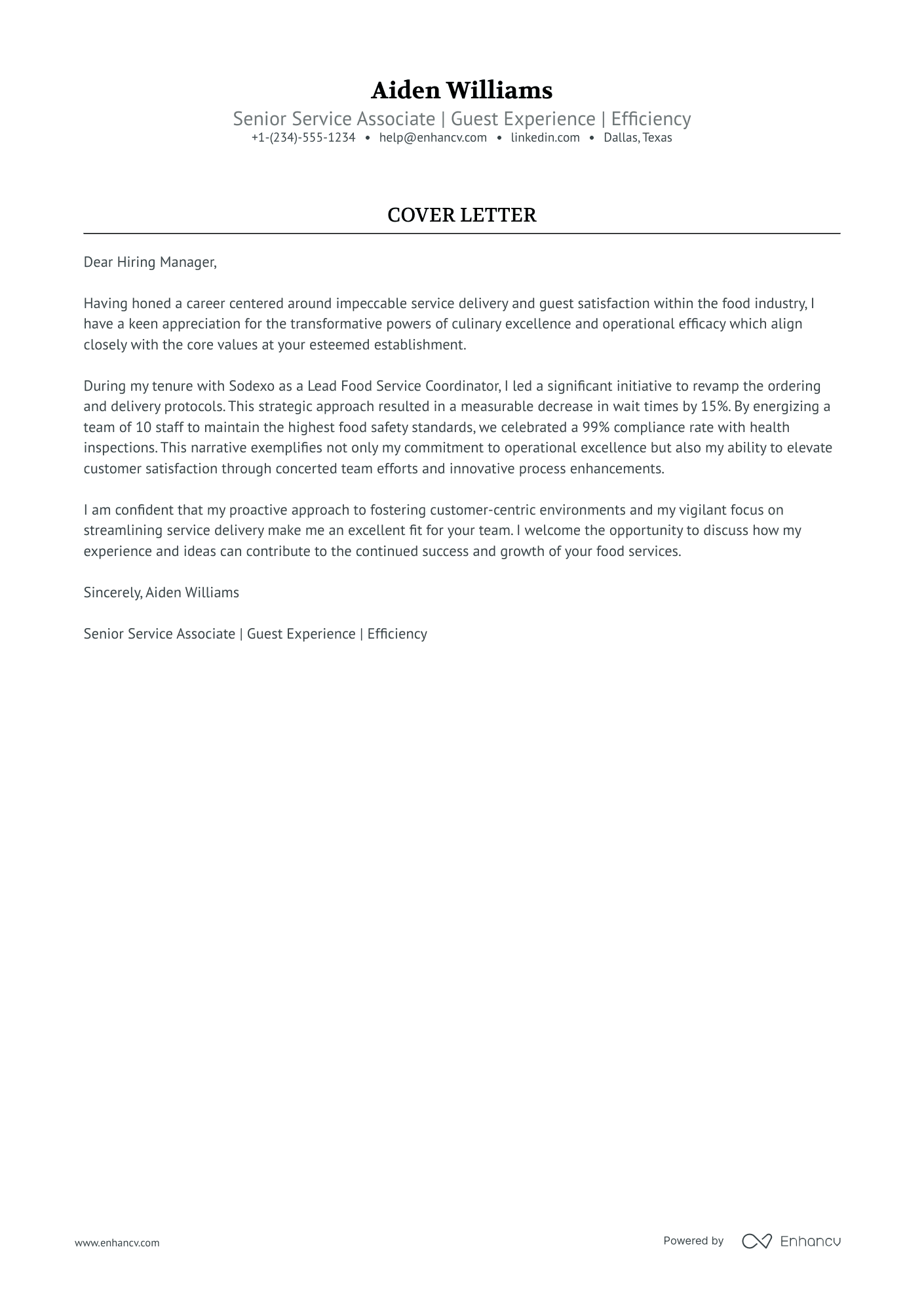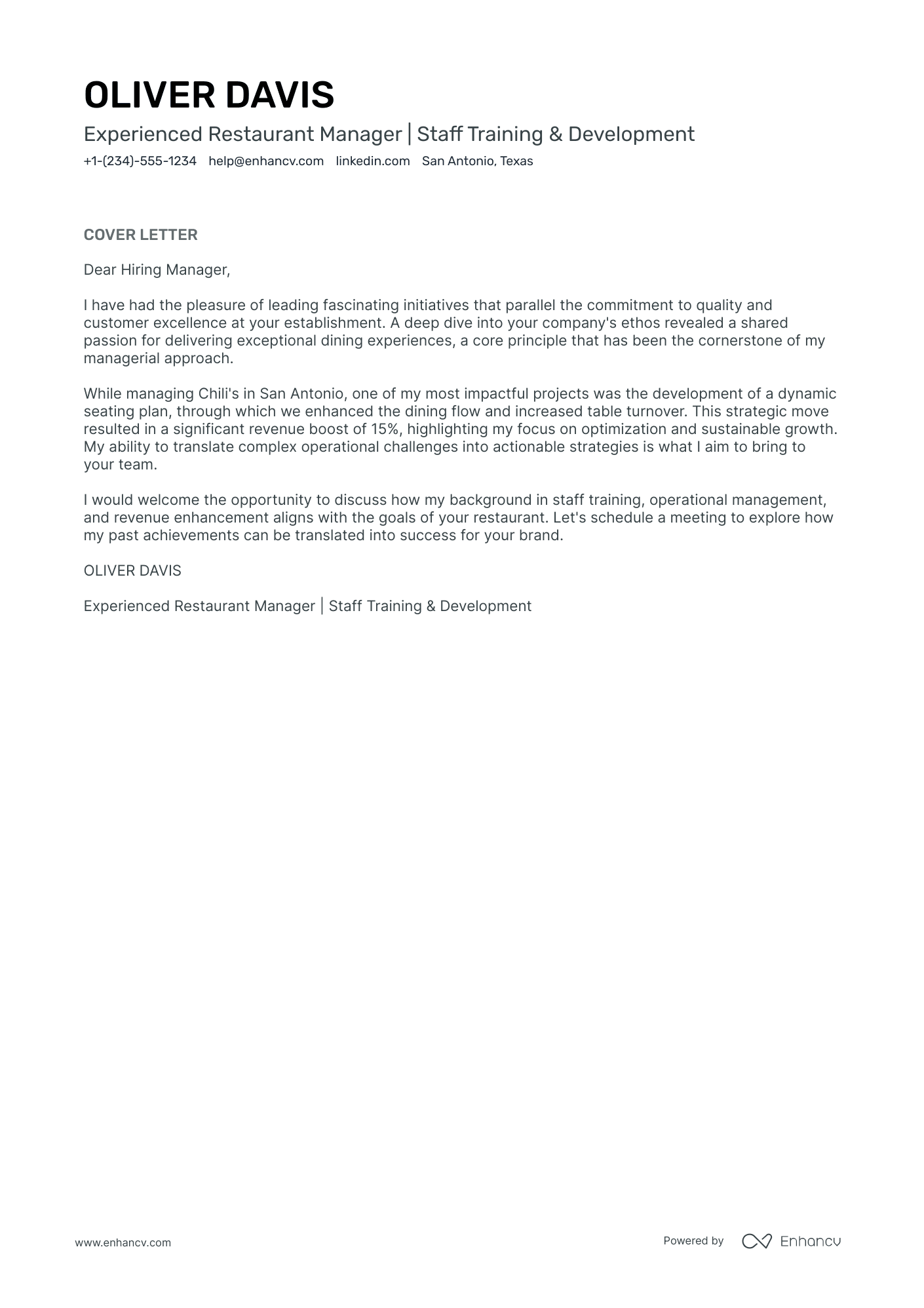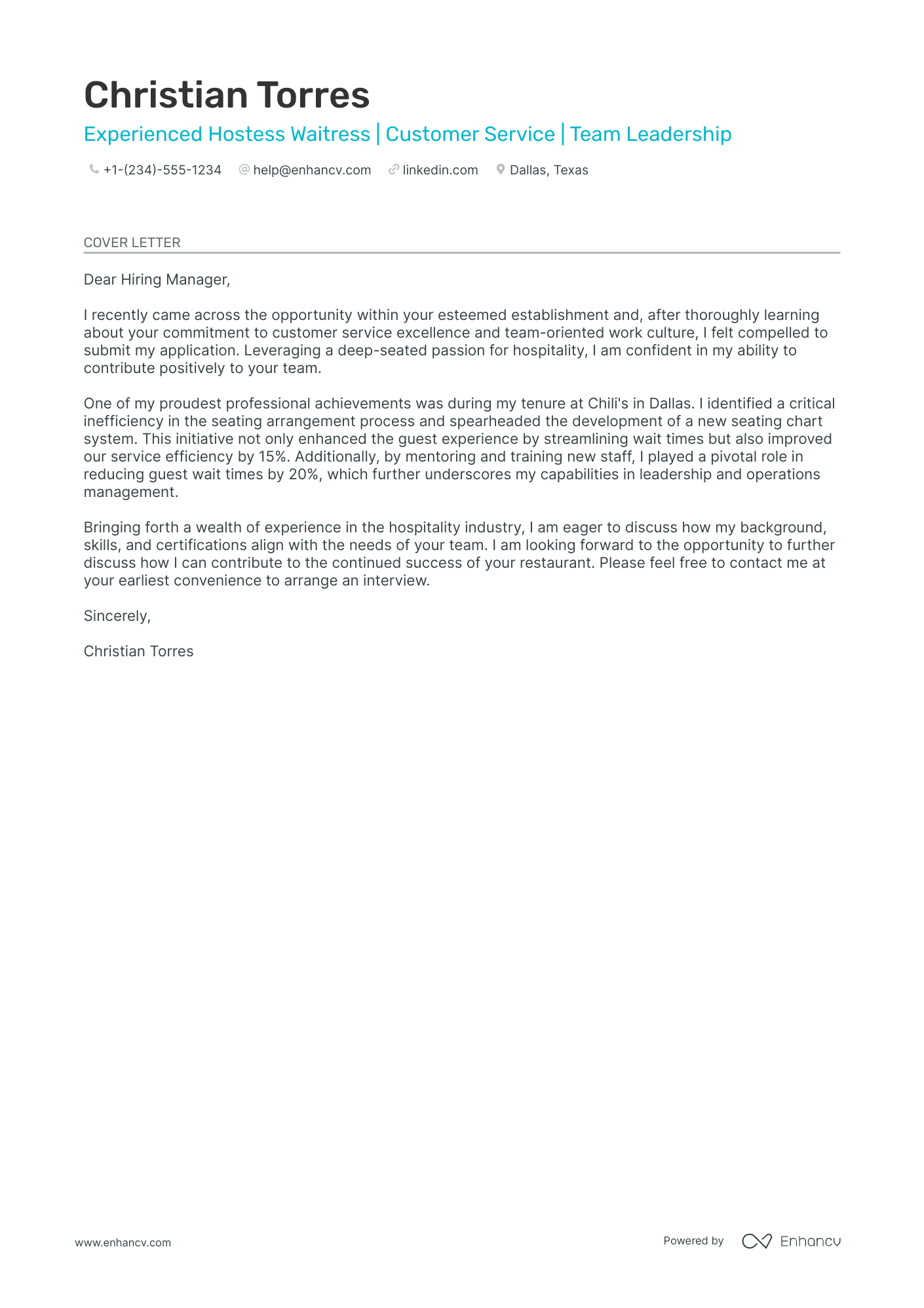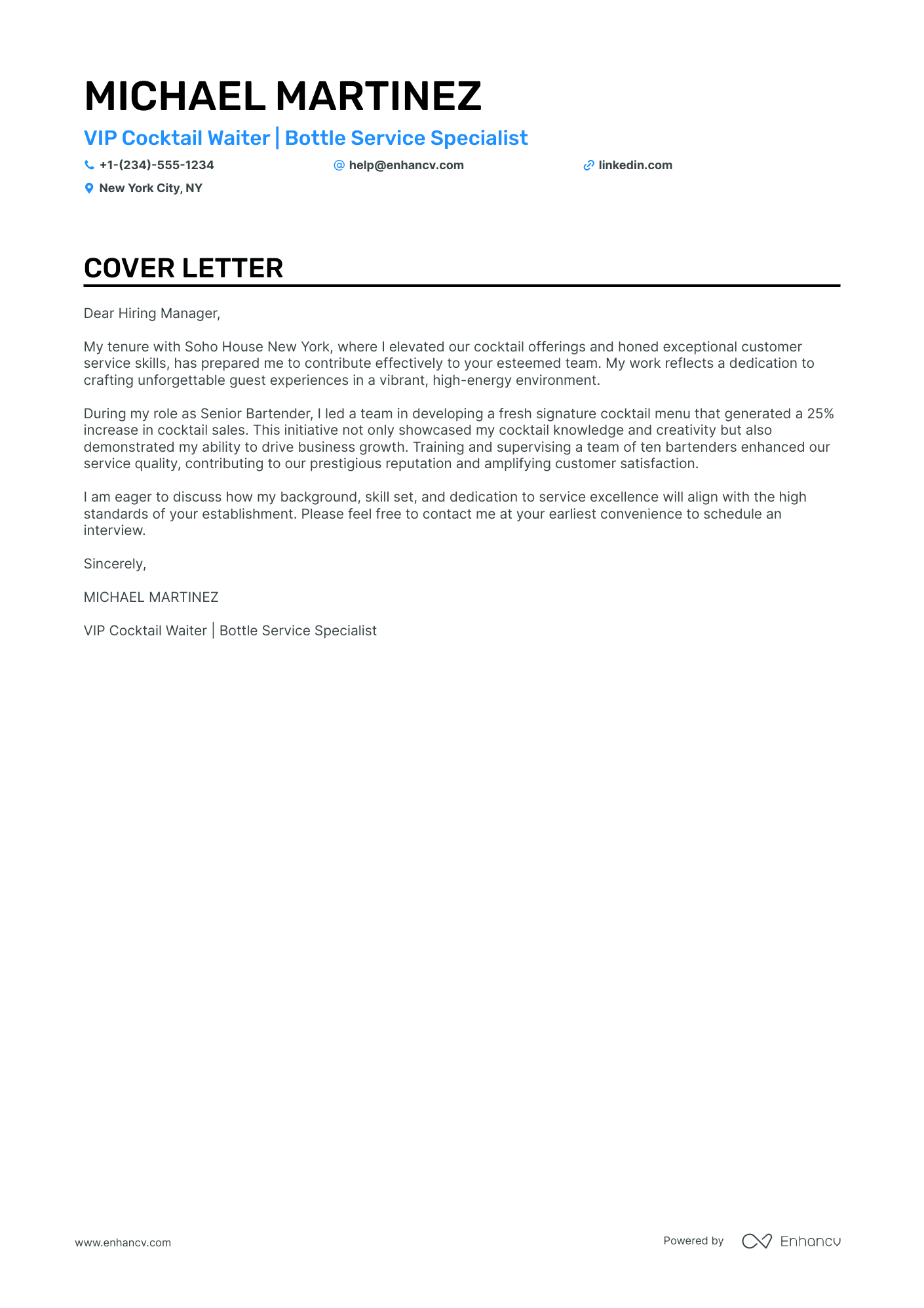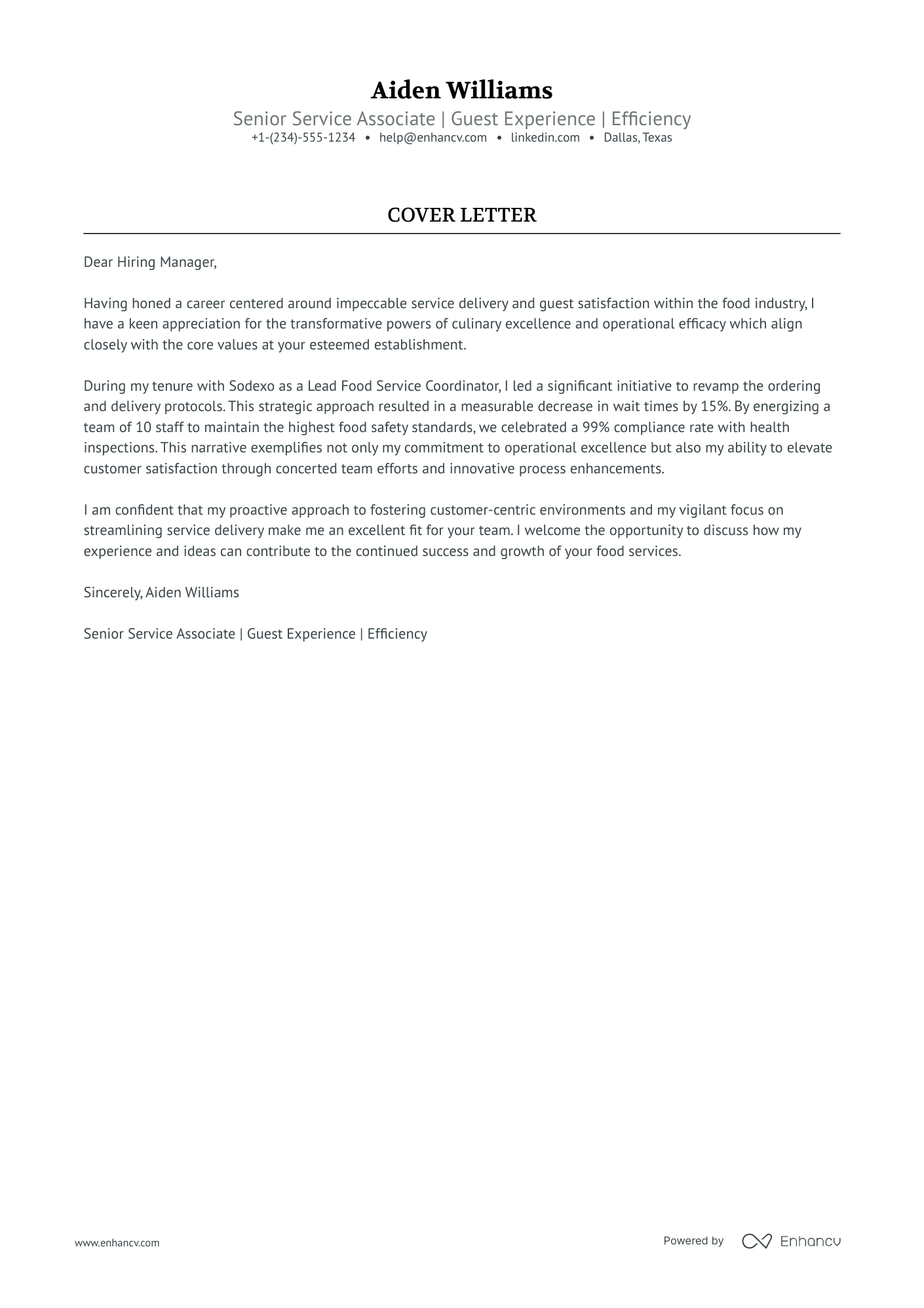As you set out to craft your waitress cover letter, the reality hits: it's more than rehashing your resume. You're here, possibly after realizing the job application demands a customized letter that showcases your professional pride without drowning in clichés. Within a concise, one-page narrative, learn to present that standout achievement that defines your service excellence—and do it with a touch of formality that captivates, not bores, your future employer.
- Including all the must-have paragraphs in your structure for an excellent first impression;
- Learning how to write individual sections from industry-leading cover letter examples;
- Selecting the best accomplishment to tell an interesting and authority-building professional story;
- Introducing your profile with personality, while meeting industry standards.
And, if you want to save some time, drag and drop your waitress resume into Enhancv's AI, which will assess your profile and write your job-winning cover letter for you.
If the waitress isn't exactly the one you're looking for we have a plethora of cover letter examples for jobs like this one:
- Waitress resume guide and example
- Baker cover letter example
- Cook cover letter example
- Fine Dining Bartender cover letter example
- Head Bartender cover letter example
- Chef cover letter example
- Restaurant Manager cover letter example
- Fast Food cover letter example
- Pastry Chef cover letter example
- Head Server cover letter example
- Banquet Bartender cover letter example
Drop your resume here or choose a file.
PDF & DOCX only. Max 2MB file size.
Waitress cover letter example
CHARLOTTE JONES
Columbus, Ohio
+1-(234)-555-1234
help@enhancv.com
- Emphasizing relevant experience, such as orchestrating a menu overhaul that shows initiative and a collaborative spirit with kitchen staff, can underscore an applicant's suitability for a leadership role within a restaurant.
- Quantifying achievements with specific metrics, for instance the 25% increase in orders and the reduction in customer wait times, provides tangible evidence of an applicant's impact and capability to enhance the dining experience.
- Demonstrating an understanding of the prospective employer's values, such as their commitment to quality and service, and mirroring that in the cover letter can create a sense of alignment between the applicant's personal ethos and the restaurant's culture.
- Expressing a genuine enthusiasm to grow with the establishment and a desire to contribute positively can signify a proactive and ambitious mindset, which is often sought after for roles in dynamic service environments.
The format of your waitress cover letter: structure, fonts, margins, and more
Your waitress cover letter should include a header (with your name, position, and date); a greeting and introductory paragraph; a body and closing paragraphs; and an optional signature.
Remember that you're writing your waitress cover letter for recruiters - as the Applicant Tracker System won't scan this content.
Here are a few more tips and tricks to keep in mind when formatting your waitress cover letter:
- Use the same font in your waitress cover letter and resume. We recommend modern fonts, e.g. Lato and Rubik, to help you stand out, instead of the stereotypical Arial and Times New Roman.
- Each paragraph should have single spacing, which is already set up for you in our cover letter templates.
- Our cover letter builder follows industry standards for your waitress cover letter formatting - with a one-inch margin, surrounding your content.
- Always export your waitress cover letter in PDF to ensure the image or text quality stays the same and your writing isn't moved about.
Let us save you time! With our free cover letter generator, you can create a professional letter instantly using your resume.
The top sections on a waitress cover letter
- Header: Includes the applicant's contact information, the date, and the employer's contact details, which is crucial for ensuring the letter reaches the right person and for potential follow-up correspondence.
- Greeting: It's important to address the hiring manager or restaurant owner by name if possible, as it demonstrates attention to detail and a personalized approach, much like service in the hospitality industry.
- Introduction: In this section, the waitress should clearly state the position she's applying for and express her enthusiasm for the role, which sets the tone for a friendly and engaging cover letter, reflecting the interpersonal skills required for the job.
- Experience and Skills: This part should highlight relevant work history and specific skills like menu knowledge, order accuracy, and superior customer service, which are key to convincing the recruiter of the applicant's suitability for the waitress position.
- Closing and Call to Action: The applicant should end the cover letter by expressing gratitude for the opportunity to apply, reiterating interest in the position, and inviting the recruiter to schedule an interview, showing eagerness and proactivity.
Key qualities recruiters search for in a candidate’s cover letter
- Excellent communication skills: Crucial for accurately taking customer orders and effectively communicating with kitchen staff and team members.
- Strong interpersonal skills: Necessary to interact positively with a diverse range of customers, ensuring a pleasant dining experience.
- Proven ability to multitask: Essential in managing multiple tables, remembering order details, and providing timely service during busy shifts.
- Attention to detail: Important for ensuring orders are correct, special dietary requirements are met, and billing is accurate.
- Physical stamina and agility: Required to handle long shifts on foot and carry trays or plates without compromising service speed or customer experience.
- Experience with point-of-sale systems: Beneficial for efficiently processing orders and payments in a modern dining establishment.
How to greet recruiters in your waitress cover letter salutation
As the saying goes, "You never get a second chance to make a first impression."
Write your waitress cover letter salutation to be more personalized to the actual hiring manager, who is set to assess your profile by:
- greeting them on a first-name basis, if you have previously communicated with them (e.g. "Dear Sam,");
- using their last name, if you have more formal communication or haven't spoken to them (e.g. "Dear Mr. Harrows" or "Dear Ms. Marshall");
- writing "Dear HR Team" or "Dear Hiring Manager", if you have no clue about who's recruiting for the role.
Search on LinkedIn, Google, or the company website to find information as to the recruiter's name.
In any case, avoid the impersonal "Dear Sir or Madam".
List of salutations you can use
- Dear Hiring Manager,
- Dear [Restaurant Name] Team,
- Dear [Hiring Manager's Name],
- Dear [Employer's Title] [Employer's Last Name],
- Dear [Employer's Full Name],
- Dear [Employer's Title and Last Name],
The waitress cover letter intro: aligning your interest with the company culture
You only have one chance at making a memorable first impression on recruiters with your waitress cover letter.
Structure your introduction to be precise and to include no more than two sentences.
Here are some ideas on how to write a job-winning waitress cover letter introduction:
- get creative - show off your personality from the get-go (if this aligns with the company culture);
- focus on your motivation - be specific when you say what gets you excited about this opportunity.
Choosing your best achievement for the middle or body of your waitress cover letter
Now that you have the recruiters' attention, it's time to write the chunkiest bit of your waitress cover letter.
The body consists of three to six paragraphs that focus on one of your achievements.
Use your past success to tell a story of how you obtained your most job-crucial skills and know-how (make sure to back these up with tangible metrics).
Another excellent idea for your waitress cover letter's middle paragraphs is to shine a light on your unique professional value.
Write consistently and make sure to present information that is relevant to the role.
A sincere and original way to end your waitress cover letter
When writing their waitress cover letter, candidates tend to use one of these phrases, "Sincerely yours" or "I look forward to hearing from you".
Both statements show good manners, but your cover letter should end in a more actionable manner.
Write about:
- how you see yourself growing in the role/organization;
- the benefits you would bring about (you'd impress even more with tangible metrics);
- the next steps in the process (provide your availability for interviews).
Keep this in mind when writing your zero experience waitress cover letter
Even though you may not have any professional experience, your waitress cover letter should focus on your value.
As a candidate for the particular role, what sort of skills do you bring about? Perhaps you're an apt leader and communicator, or have the ability to analyze situations from different perspectives.
Select one key achievement from your life, outside work, and narrate a story that sells your abilities in the best light.
If you really can't think of any relevant success, you could also paint the picture of how you see your professional future developing in the next five years, as part of the company.
Key takeaways
Creating your waitress cover letter should be a personalized experience for the role and the recruiter, where you:
- Format your cover letter using the same ATS-friendly font (e.g. Railway) as you did for your resume;
- Greet recruiters, using their name, and follow up with two sentences to introduce yourself, your interest in the role, and to stand out;
- Map out one key success from your career (or life) that has taught you job-crucial skills;
- Substitute your lack of experience with an achievement from your internships, degrees, or volunteering gigs;
- End with a promise for your potential or your availability for an interview.
Waitress cover letter examples
By Experience
Waitress No Experience
By Role
